Zionism: A Racist Project in the European Colonial Tradition
Stewart McGill & Alan Polak
Debates about the levels of “antisemitism on the left”, and the relationship between antisemitism and anti-Zionism, crop up on a regular basis. About as regularly as Israel bombing Gaza, or “mowing the lawn” as the Israeli Defence Forces (IDF) describe the slaughter.
Following Jeremy Corbyn’s election to the Labour leadership in 2015, a narrative emerged about both him and his Labour Party being fundamentally antisemitic. This accelerated after Corbyn’s surprisingly good electoral performance in 2017.
It was absurd: Corbyn is one of the most anti-racist politicians in these islands over the last forty years. Further, complaints of antisemitism were directed against around 0.3 percent of Labour Party members. Some of the charges were dismissed immediately, some of the accused left, others were sent remainders regarding conduct. In July 2019, the party’s General secretary wrote in a published reply to the Deputy Leader that “antisemitism-related cases that have been taken through the stages of our disciplinary procedures since September 2015 relate to roughly 0.06% of the Party’s average membership during this time.”
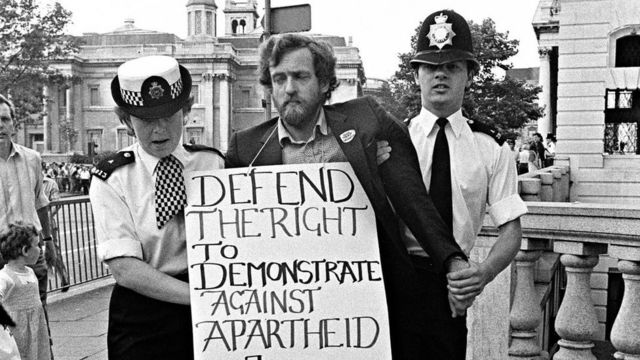
Hardly a hotbed of antisemitism, but the absurdity of the narrative was successfully employed by the Israel Lobby and a compliant media that wanted Corbyn to fail. Some are trying to develop an equally absurd narrative: that of a leftist, secular “early years” Zionism, often Marxist in character and committed to Jews and Arabs working together in Palestine in pursuit of common goals, including that of proletarian revolution. An inclusive Zionism, corrupted later by war and right-wing influences.
This approach seeks to rehabilitate the essence of Zionism, arguing that the failure to take an appropriately nuanced view of the doctrine leads to a questioning of Israel’s legitimacy as a state, i.e. that it’s a settler colony formed by the ethnic cleansing of the Arabs. However, it is a settler colony, formed by ethnic cleansing of Arabs; and Zionism is a racist creed in concept, theory and practice.
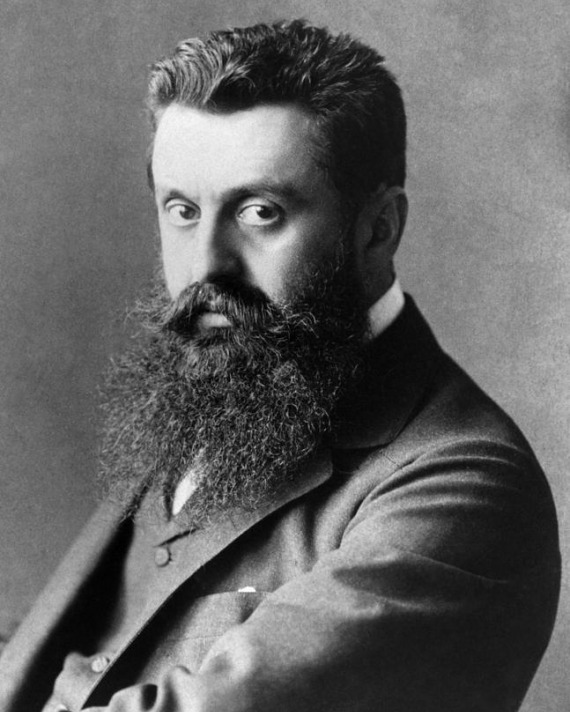
Dear diary
In 1895, Alexander Herzl, the founder of modern, secular Zionism, wrote in his diary:
We must expropriate gently the private property on the state assigned to us. We shall try to spirit the penniless population across the border by procuring employment for it in the transit countries, while denying it employment in our country. The property owners will come over to our side. Both the process of expropriation and the removal of the poor must be carried out discretely and circumspectly. Let the owners of the immoveable property believe that they are cheating us, selling us things for more than they are worth. But we are not going to sell them anything back.
This was written a year before the publication of his Der Judenstaat pamphlet in 1896, that advocated the creation of a state of the Jews in Palestine. He may have advocated doing it “gently,” though denying the indigenous people employment opportunities doesn’t sound that gentle. But statement makes it very clear that Zionism was all about creating a predominately Jewish state via forcing out the Arab population, an inherently racist endeavour in the tradition of European colonialism. The Arabs are referred to here as “the penniless population.”
The reality of dispossession
At the time of the 1947 UN resolution that recommended partition, Arabs remained in possession of approximately 85% of the land while Jews owned less than 7%. Herzl’s plans did not come together. The population of Palestine at the end of 1946 was estimated to be almost 1,846,000, with 1,203,000 Arabs (65%) and 608,000 Jews (33%).
Despite these facts, the UN proposed that the Arab state be constituted from only 45.5% of the whole of Palestine, while the Jews would be awarded 55.5%. A total disgrace that the Palestinians and Arab states rightly rejected: this precipitated the ethnic cleansing of Arabs by the Jewish forces and the war that led to the formation of the state of Israel.
The Soviet Union supported the resolution as did a number of communist parties globally. Realpolitik drove the Soviet decision, they thought that Israel would be a good, anti-British ally. This did not work out well and the Soviets gradually moved to support the Arab camp. People on the left who cite Soviet support for the travesty of that UN resolution in order to defend the Zionist idea should remember two things: not everything that the Soviet Union did was right; and that it went against Lenin’s strong opposition to Zionism.
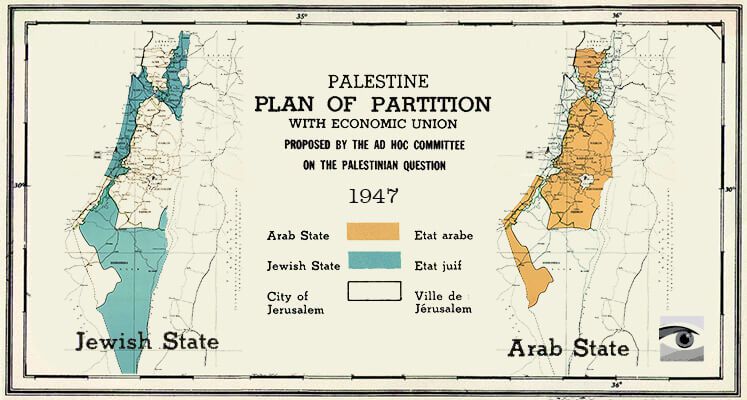
A land without a people, a people that mattered
As Nur Masalha writes in his Expulsion of the Palestinians: The Concept of “Transfer” in Zionist Political Thought, 1882-1948:
It should not be imagined that the concept of transfer was held only by maximalists or extremists within the Zionist movement. On the contrary, it was embraced by almost all shades of opinion, from the Revisionist right to the Labour left. Virtually every member of the Zionist pantheon of founding fathers and important leaders supported it and advocated it in one form or another, from Chaim Weizmann and Vladimir Jabotinsky to David Ben-Gurion and Menahim Ussishkin. Supporters of transfer included such “moderates” as the “Arab appeaser” Moshe Shertok and the socialist Arthur Ruppin…More importantly, transfer proposals were put forward by the Jewish Agency itself, the government of the Yishuv.
When Zionists like Israel Zangwill and Chaim Weizmann – later to become the first president of Israel – talked about “a land without a people, and a people without a land,” they were not being literal. They knew there were people there, but they were not people to be regarded as equally human. Nor was the suffering of these untermenschen seen to be as important as that of the Jewish people.
As Masalha puts it:
They did not mean that there were no people in Palestine, but that there were no people worth considering within the framework of the notions of European supremacy that then held sway. In this connection, a comment by Weizmann to Arthur Ruppin, the head of the colonisation department of the Jewish Agency, is particularly revealing. When asked by Ruppin about the Palestinian Arabs, Weizmann replied: “The British told us that there are some hundred thousands negroes (Kushim) and for those there is no value.”
Zangwill himself elucidated on the concept with true colonialist clarity in 1920:
If Lord Shaftesbury was literally inexact in describing Palestine as a country without a people, he was essentially correct, for there is no Arab people living in intimate fusion with the country, utilising its resources and stamping it with a characteristic impress: there is at best an Arab encampment.
Two classic imperialist and racist tropes are at play here: denial of a full shared humanity to the indigenous people, and the lie that those people did nothing with the land.
Asher Avi Ginsberg, a Russian Jew who visited Palestine in 1891, was very critical of the ethnocentricity of Zionism and the exploitation of the local people by the Zionists. He observed that the “pioneers” believed that:
…the only language that the Arabs understand is that of force.
(They) behave towards the Arabs with hostility and cruelty, trespass unjustly upon their boundaries, beat them shamefully without reason and even brag about it, and nobody stands to check this contemptible and dangerous tendency.
Nobody stands to check them today either. Plus ça change, plus c’est la même chose.
Labour Zionism
Some people adduce the spirit of Ber Borochov and the Poale Zion movement with which he is associated, in an attempt to restore Zionism’s leftist credentials. Borochov, who died in 1971, may have advocated a harmonious and revolutionary relationship between Arabs and Jews in Palestine, but he was hardly in the mainstream of Zionism and his views on the Arab population betray, at the very least, an imperialist mindset. He felt that the people he called “natives of Palestine” lacked any culture of their own and did not have any outstanding national characteristics.
They easily and quickly adopt any imported cultural character higher than their own; they cannot unite in organized resistance against external influences, they are not capable of national competition…(therefore) the natives of Palestine will assimilate economically and culturally with whoever brings order into the country and undertakes the development of the forces of production of Palestine.
If trying to convince that Zionism is not inherently racist, then Borochov is not the man to invoke.
The Poale Zion movement was ridden with factionalism until it faded away and became assimilated with other organisations. Many of the factions shared Borochov’s vision of cooperation (and his patronising attitude to the “natives”), though many did not, and the Borochov tendency remained a minority view in Zionism. The British Poale Zion affiliated to the Labour Party in 1920. It renamed itself the Jewish Labour Movement in 2004, and is a strident apologist of Israel.
The Histadrut (General Organisation of Workers) formed in Israel in 1920 was a racist, Zionist organisation that would not accept Arabs. Its main role under the British Mandate period (1920-1948) was to bring the Jewish work force under its control in order to ensure no solidarity or integration occurred between Palestinian and Jewish workers – a policy it called “Labour Zionism.” Led by David Ben Gurion, the future Israeli Prime Minister and Labour Party leader, it actively promoted racial discrimination and boycotts. As an organisation it refused to countenance having Palestinians and Jews together in the same union: Ben Gurion called it “the evil of mixed labour.”
The Histadrut actively broke up unions like the Union of Railway, Postal and Telegraph Workers which had a mixed Jewish and Arab Palestinian membership. As it established its own companies, eventually becoming the second largest employer in the country, it refused to employ non-Jews. Similarly, it lobbied the British authorities for separate pay rates for Jews and Arabs and did what it could to undermine Palestinian trade unions, lobbying against them on the grounds that they were separatist, exclusionary and against the spirit of workers’ solidarity. Without any sense of irony.
The fruits of Zionism
The racist and colonialist creed of Zionism found expression in the ethnic cleansing of Palestine in 1948 that inflicted the Nakba on the Palestinian people. Its realisation continues today with the increasingly brutal colonisation of the West Bank and an 18-year blockade of Gaza, punctuated by various episodes of “mowing the lawn” i.e. slaughters of innocents through bombing and land invasion. At the time of writing, over 11,000 people have been killed in Gaza in Israel’s response to the Hamas attacks of 7 October, including over 4,000 children.
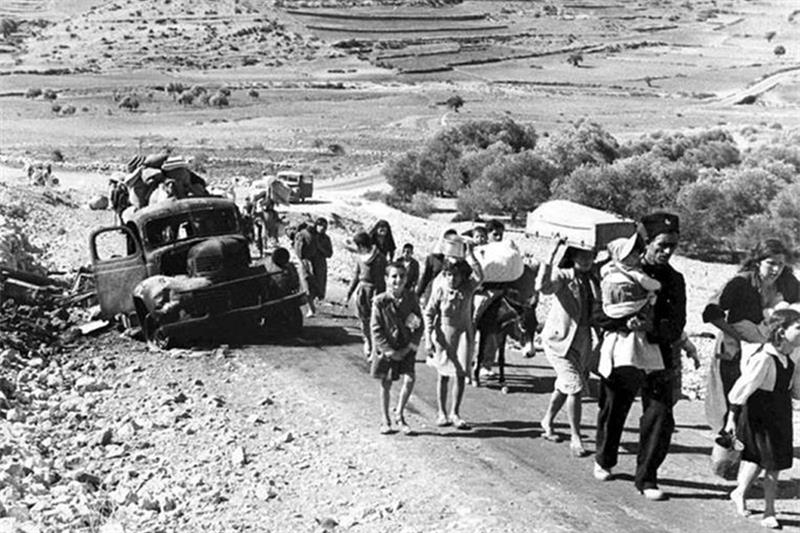
It has to be remembered that the excesses of the 1948 ethnic cleansing, the Suez war in 1956 that resulted in the massacre of 400 Palestinians in and around Khan Yunis, and the 1967 land grabs, all took place under regimes led by the Israeli Labour movement. These excesses cannot be explained by the subsequent triumph of the Ze’ev Jabotinsky “revisionist” school of Zionism, an extreme right-wing political ideology that find expression today in the governing Likud party.
It should be acknowledged that there are brave people and organisations within Israel that fight the dominant culture and speak up for the Palestinians. There were similarly brave people inside the white population of racist South Africa who fought against the regime, including many Jews inside and outside the Communist Party. However, their existence did not make it any less of an apartheid state.
More than this, there is solid evidence that the current government is broadly reflective of public opinion in Israel, and that the racist attitudes afforded by the supremacist creed of Zionism have in fact hardened in recent years. According to one poll taken last year, 62 percent of Jewish Israeli voters identified as right-wing. Among young people aged 18-24, that number rose to 70 percent. This is why Netanyahu is Prime Minister, with some seriously racist people in his cabinet.
If self-determination means apartheid
Condemnation of Zionism in theory and practice does not mean that you are an antisemite. It means that you are a regular, anti-racist human. Similarly, denying Israel’s right to exist as a racist, expansionist state that brutalises the Palestinians and regularly attacks its neighbours is not antisemitic. Denying white South Africa’s right to exist as an apartheid state was never condemned as “anti-white” or “anti-Dutch,” except by right-wing racist supporters of Pretoria.
Why is it antisemitic to suggest that Israel should cease to be a sectarian state that discriminates against people and kicks them out of their homes because they are not Jewish? That Palestinians and Jewish people should enjoy equal rights in the state that succeeds the currently unsustainable and murderous status quo? That Zionism was always doomed to fail in its basic purpose of providing a safe haven for Jewish people, because you cannot achieve that by stealing someone else’s country and continuing to brutalise and colonise the descendants of the people that you displaced?
There are many forces that militate against a peaceful solution in Palestine. These forces will be strengthened if people are scared to speak the truth for fear of having the ‘antisemite’ slur cast at them, and their views being damned as those of terrorists.
The weaponisation of antisemitism, reinforced by the dubious exculpation of Zionism as a fundamentally racist creed, cannot be allowed to win: the Palestinian people deserve better, much better.
Stewart McGill is a former member of the Communist Party of Britain, writing in a personal capacity.
Alan Polak is a secular Jew from an Orthodox Jewish family, and author of The Cultural Representation of the Holocaust.
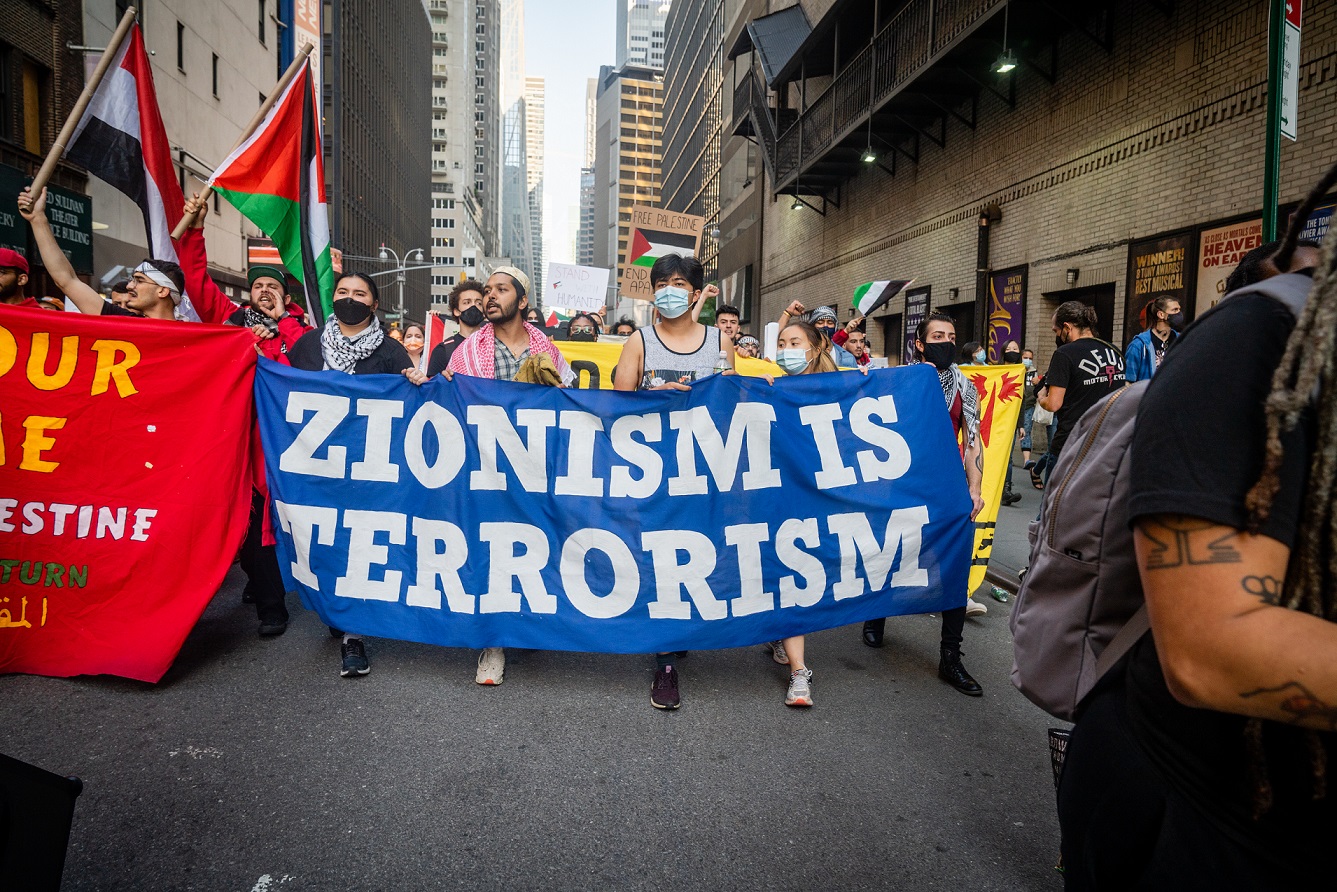

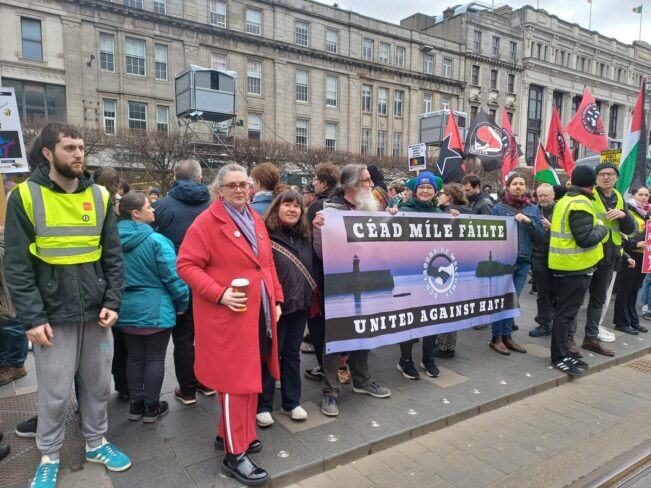






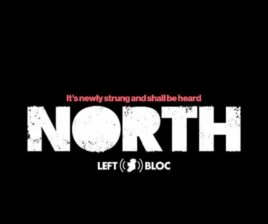

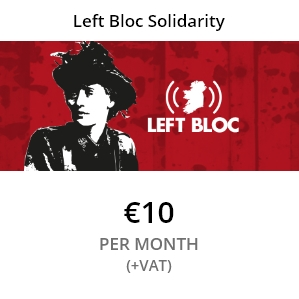


Comments